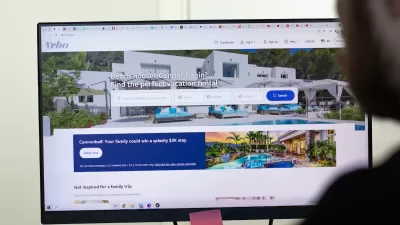How can city officials mitigate the negative impacts of short-term rentals?

A blog post in Urban Wire by Luisa Godinez-Puig and Jorge González-Hermoso outlines the costs and opportunities presented by the rise of short-term rentals (STRs).
On the one hand, incentivizing unregulated growth can result in the reduction of for-sale and rental housing supply and the displacement of local communities because of increasing rent costs or units being taken off the rental and ownership markets. On the other, residents can potentially diversify income sources, and cities can see an increase economic activities and tourism. As is often the case, different communities are affected in different ways.
The authors describe STR policies from cities around the world that effectively regulate the industry, as well as the demographics of STR ownership. “If the government doesn’t set incentives correctly, STR-friendly agreements, like the one in Mexico City, may end up benefiting wealthy individuals with multiple properties who are running large businesses, rather than those leveraging their sole assets to diversify their income sources.”
The authors also note that renters could suffer most from an increase in STRs in their community and describe ways that governments can prevent displacement. The authors conclude, “Each of these solutions has its merits, but to find the best solution for a particular city, local governments should prioritize equity and proactively consider the consequences of increasing STRs in their communities, including how to help STR owners in communities of color benefit from this market and how to use public funds generated by STRs for housing projects.”
FULL STORY: With an Abundance of Short-Term Rentals, Who Wins and Who Loses?

Maui's Vacation Rental Debate Turns Ugly
Verbal attacks, misinformation campaigns and fistfights plague a high-stakes debate to convert thousands of vacation rentals into long-term housing.

Planetizen Federal Action Tracker
A weekly monitor of how Trump’s orders and actions are impacting planners and planning in America.

Chicago’s Ghost Rails
Just beneath the surface of the modern city lie the remnants of its expansive early 20th-century streetcar system.

Bend, Oregon Zoning Reforms Prioritize Small-Scale Housing
The city altered its zoning code to allow multi-family housing and eliminated parking mandates citywide.

Amtrak Cutting Jobs, Funding to High-Speed Rail
The agency plans to cut 10 percent of its workforce and has confirmed it will not fund new high-speed rail projects.

LA Denies Basic Services to Unhoused Residents
The city has repeatedly failed to respond to requests for trash pickup at encampment sites, and eliminated a program that provided mobile showers and toilets.
Urban Design for Planners 1: Software Tools
This six-course series explores essential urban design concepts using open source software and equips planners with the tools they need to participate fully in the urban design process.
Planning for Universal Design
Learn the tools for implementing Universal Design in planning regulations.
planning NEXT
Appalachian Highlands Housing Partners
Mpact (founded as Rail~Volution)
City of Camden Redevelopment Agency
City of Astoria
City of Portland
City of Laramie





























